
…What do the people want of the place? They want it to be filled with thinking
persons as open and adventurous as its architecture.
A nest of fearties is what they do not want.
A symposium of procrastinators is what they do not want.
A phalanx of forelock-tuggers is what they do not want.
And perhaps above all the droopy mantra of ‘it wizny me’ is what they do not want…
– Edwin Morgan, Open The Doors
Perhaps Scotland’s first Makar, our national poet, may have been hoping for a little too much when he wrote his famous verses to commemorate the formal opening of the shiny new Holyrood building in 2004.
Every office and factory has its share of fearties. Every company has its procrastinators and forelock-tuggers lacking the talent and ambition to do very much but keep their heads down in the hope of having a seat when the music stops.
But, more in hope than expectation, more in bright-eyed optimism than grim experience, we still expect our politicians to be better than that. We want the vision, the talent and the ambition. We want the principles, the passion, and the sense that their work matters and is changing our country, our world, for the better.
However good our governments are, they need challenged, questioned and tested. However good our MSPs are – and, on some of them at least, the jury will be out for a while – the mechanics of democracy can foil their best efforts.
Anyone who has sat through one of Holyrood’s committee meetings is unlikely to have mistaken it for Beyonce at Murrayfield. Many MSPs are well briefed and good, active listeners. Too many others? They would miss the point if it was on a roll in the canteen.
We can talk about the calibre of our politicians and what might be done to improve it – particularly when intelligent, independent-minded politicians have taken a one-term look at Holyrood and run a mile – but what needs to change most urgently is the idea that MSPs are somehow there to defend the government when scrutinising draft legislation instead of being there to challenge and query ministers’ plans.
Much as it will make the SNP blanche, Westminster’s committees often provide an exemplar of rigour with Tory MPs happily stress-testing the UK Government’s actions until they snap. Even the Lords provide more frank and fearless criticism of draft legislation than Holyrood’s committees.
Morgan would be aghast at so many fearties and forelock-tuggers in our parliament. They are not what he had in mind when exhorting:
…We give you this great building, don’t let your work and hope be other than great
when you enter and begin.
So now begin. Open the doors and begin.
We do not need to begin again but too much of the work done at Holyrood is “other than great” and we really should begin, seriously, in a process stripped of passion and partisan politics, to ask why?

Enjoy the convenience of having The Sunday Post delivered as a digital ePaper straight to your smartphone, tablet or computer.
Subscribe for only £5.49 a month and enjoy all the benefits of the printed paper as a digital replica.
Subscribe